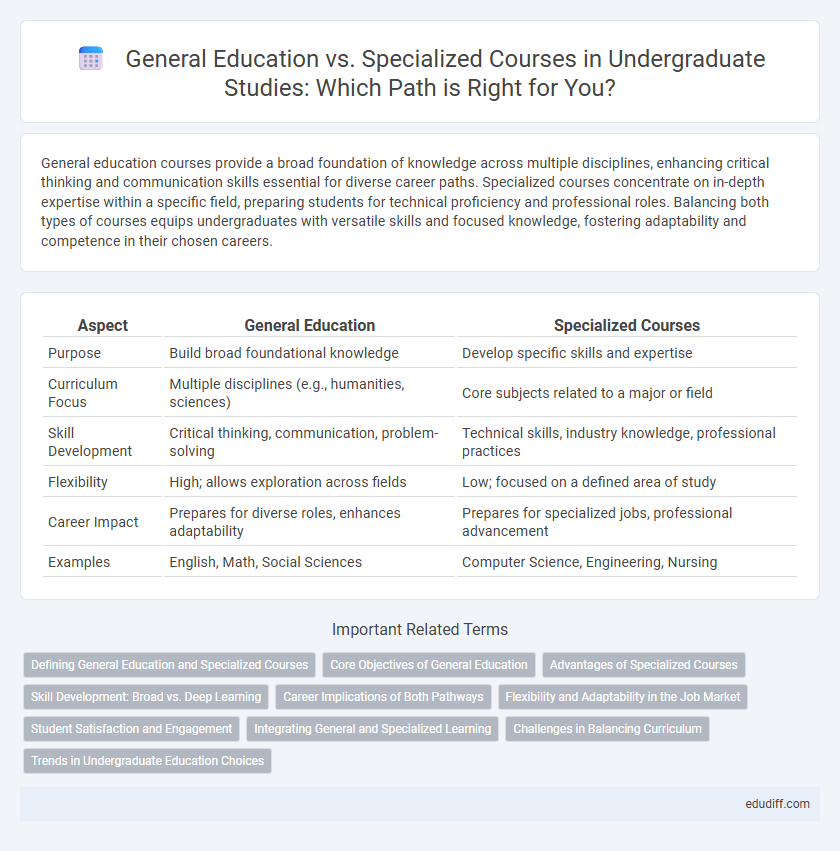General education courses provide a broad foundation of knowledge across multiple disciplines, enhancing critical thinking and communication skills essential for diverse career paths. Specialized courses concentrate on in-depth expertise within a specific field, preparing students for technical proficiency and professional roles. Balancing both types of courses equips undergraduates with versatile skills and focused knowledge, fostering adaptability and competence in their chosen careers.
Table of Comparison
| Aspect | General Education | Specialized Courses |
|---|---|---|
| Purpose | Build broad foundational knowledge | Develop specific skills and expertise |
| Curriculum Focus | Multiple disciplines (e.g., humanities, sciences) | Core subjects related to a major or field |
| Skill Development | Critical thinking, communication, problem-solving | Technical skills, industry knowledge, professional practices |
| Flexibility | High; allows exploration across fields | Low; focused on a defined area of study |
| Career Impact | Prepares for diverse roles, enhances adaptability | Prepares for specialized jobs, professional advancement |
| Examples | English, Math, Social Sciences | Computer Science, Engineering, Nursing |
Defining General Education and Specialized Courses
General education courses provide a broad foundation in essential skills such as critical thinking, communication, and problem-solving across multiple disciplines like humanities, sciences, and social sciences. Specialized courses focus on in-depth knowledge and skills related to a specific major or professional field, preparing students for expertise and career requirements. Together, general education ensures well-rounded intellectual development while specialized courses cultivate subject-specific proficiency.
Core Objectives of General Education
General Education courses aim to develop critical thinking, communication, and quantitative reasoning skills that serve as foundational competencies across all disciplines. These core objectives ensure students acquire a broad intellectual framework, fostering interdisciplinary awareness and ethical reasoning. In contrast, Specialized Courses concentrate on in-depth knowledge and technical skills specific to a chosen major, preparing students for professional expertise and career readiness.
Advantages of Specialized Courses
Specialized courses offer undergraduates in-depth knowledge and practical skills tailored to their chosen field, enhancing career readiness and expertise. These courses provide targeted learning experiences that align with specific industry demands, increasing employability and professional development opportunities. Focused curricula enable students to engage with advanced concepts, research, and hands-on projects, fostering mastery in their area of study.
Skill Development: Broad vs. Deep Learning
General education courses cultivate broad skill sets such as critical thinking, communication, and problem-solving, applicable across diverse fields and enhancing adaptability. Specialized courses provide deep learning and technical expertise in a specific discipline, fostering advanced skills and professional competence. Balancing general education with specialized courses ensures comprehensive skill development, preparing undergraduates for both versatile career paths and subject-specific challenges.
Career Implications of Both Pathways
General education courses cultivate critical thinking, communication, and broad knowledge essential for adaptability in diverse career environments. Specialized courses provide in-depth expertise and technical skills directly aligned with specific professions, enhancing job readiness and competitiveness in targeted fields. Balancing both pathways equips undergraduates with a versatile foundation and specialized competencies critical for long-term career growth and flexibility.
Flexibility and Adaptability in the Job Market
General education courses provide undergraduates with broad knowledge and critical thinking skills that enhance adaptability across various industries. Specialized courses develop in-depth expertise and technical skills tailored to specific career paths, increasing job market competitiveness. Balancing both educational approaches equips students with flexibility to navigate evolving job demands and diverse professional environments.
Student Satisfaction and Engagement
Specialized courses in undergraduate programs enhance student satisfaction by providing in-depth knowledge and practical skills aligned with career goals, leading to higher engagement levels. General education courses offer a broad knowledge base that fosters critical thinking and adaptability, which are essential for holistic development and long-term success. Balancing general education with specialized courses creates a comprehensive curriculum that maximizes both student satisfaction and active engagement throughout the academic journey.
Integrating General and Specialized Learning
Integrating general education with specialized courses enhances critical thinking and adaptability by providing a broad knowledge base alongside in-depth expertise. This combination prepares undergraduates for real-world challenges by linking interdisciplinary perspectives with focused skills in their major fields. Effective curriculum design blends foundational concepts from general education with targeted specialization to foster holistic academic development and career readiness.
Challenges in Balancing Curriculum
Balancing general education and specialized courses presents significant challenges in undergraduate curricula due to differing learning objectives and credit requirements. Students often struggle to allocate sufficient time for foundational knowledge while pursuing depth in their major, leading to scheduling conflicts and increased academic pressure. Universities must optimize course offerings and advising to ensure comprehensive skill development without compromising specialization.
Trends in Undergraduate Education Choices
Undergraduate students increasingly prioritize specialized courses over general education to align their studies with specific career goals and industry demands. Data from higher education institutions reveal a significant rise in enrollment for fields such as computer science, engineering, and health sciences, reflecting market-driven trends. Simultaneously, general education remains essential for developing critical thinking and communication skills, balancing specialized knowledge with broader intellectual growth.
General Education vs Specialized Courses Infographic

 edudiff.com
edudiff.com